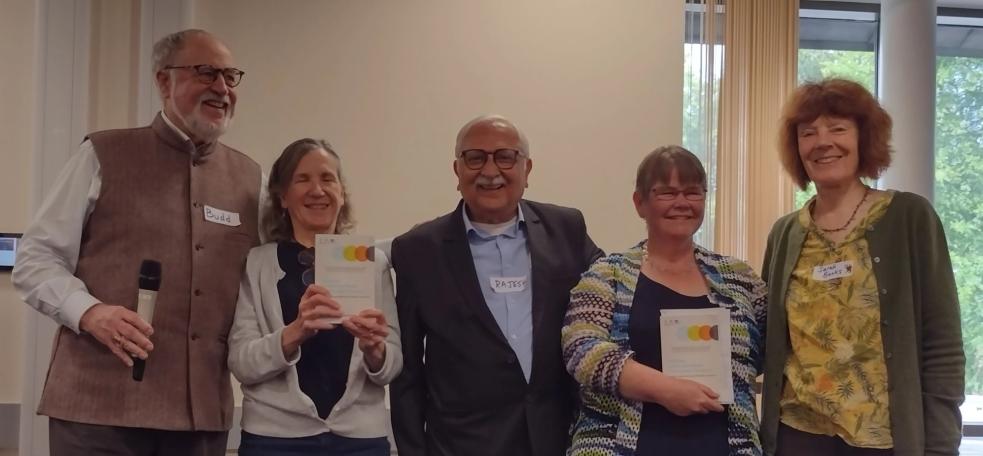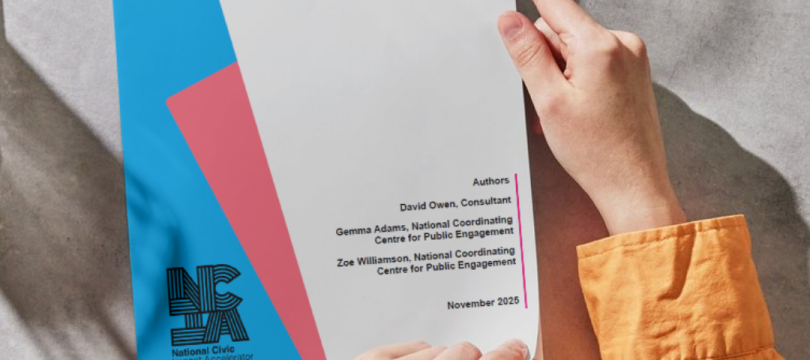Margins to Mainstream: Reflecting on Participatory Action Research
NCCPE Co-director, Sophie Duncan, reflects on being part of a recent event held by Durham University Centre for Social Justice and Community Action (CSJCA). Test
‘From the Margins to the Mainstream? Celebrating and Challenging Participatory Action Research’ was an opportunity to come together with a group of people committed to PAR from across the UK, with a small number of international guests too.
I had the privilege of summing up the morning – where there were wonderful talks and discussions about the past, present and future of PAR. In the afternoon you could join two workshops relating to specific PAR practices, before returning to plenary, where we had a celebration of Sarah Bank’s work in light of her upcoming retirement.
Here’s some highlights from what I heard.

Community voices and societal challenges
It is always inspiring and humbling to hear from people who have participated within PAR from community contexts.
Yvonne Moffitt, a community researcher energised us with her passion for PAR, explaining how the CSJCA was the heart of what is wonderful about PAR – providing space to grow and develop.
And the Contemporary Belonging Youth Research team described their work with the Manchester Museum, exploring how personal, communal and institutional histories shape contemporary collaborations. Their workshop encouraged us to reflect on our own stories of belonging and change and consider how this influences how we work. You can find out more about their work here.
Mary Brydon Miller encouraged us to ‘dig where we stand’ explaining that even in difficult contexts we can do the work we know to do. She encouraged us to deepen our roots, broaden our reach and look to the future.
The power of generous networks
We discussed the importance of networks to enable people to learn from one another, exchange ideas, effect change, mourn losses. Within this engaged community there was a generosity of sharing ideas, creating places that are connected across multiple sites of practice in the UK and internationally. With that in mind, we were encouraged to join the UK Participatory Research Network (UKPRN) to support people working in participatory research.
Reward and recognition are often lacking for people invested in PAR, so it was great to hear the importance of recognising one another’s work. How do we set out to encourage others who are working in important areas of PAR? Gina Porter remembered how Budd Hall’s recognition of their work was a first, and an important endorsement that helped build momentum for the work she and her colleagues were doing.
Time, trust, and ethical practice
Group discussions explored the importance of time. We were encouraged to ‘move at the speed of trust’ and to celebrate slow scholarship, slow learning, and slow relationship building. The perennial challenge of time, needing to do things more quickly, rather than to spend the time to do them ethically and well. People reflected on the challenges faced by people getting started, with concerns about if they had enough time, whether the community would want to work alongside them, and the pressures of publishing academic outputs.
Margins vs. mainstream
People reflected on whether they wanted PAR to be mainstream, preferring perhaps to be at the margins, where new and emergent practice could happen, and where activist approaches were welcome.
Concerns were raised about super serving some communities at the expense of others, and how this sits in tension with the need for long term sustained relationships with communities.
Honouring Sarah Banks and looking forward
With Sarah Banks’ upcoming retirement, we considered what future roles look like for people who have PAR at their core. Sarah shared she would remain engaged in some capacity - an encouraging and inspiring reminder of the enduring nature of this work.
Final Reflections
This event was a joy to be part of.
We sang, drew, reflected, and even launched a book; 'Teaching Community-Based Participatory Research' edited by Rajesh Tandon and Budd Hall, UNESCO Chair in Community-based Research & Social Responsibility in higher education.
I was there at the start of the CSJCE, when Durham were involved in the Beacon for Public Engagement. It reminded me of the privilege I have had working with so many committed and remarkable people, the learning that I have benefitted from, and the importance of all this work to a future HE sector that is inclusive and engaged with society.
I created a short prose containing quotes from the authors of each of the chapters of the book, all of whom have acted as mentors on the Knowledge for Change Hubs, I hoped it might encourage others to read it and draw on the insights therein.
These are the stories
Stories of K4C mentors
'Stories of how they teach, facilitate and co-learn'
Stories of the initiators of K4C
'In 1977 Rajesh found Budd, as a reference first, and then a lifelong colleague and friend'
The dynamics of community based participatory research requires participants to:
'actively think, read, respond, write and reflect'
'learn to explore, collaboratively enquire, foster collaborative action, live together in a communal world'
'to recognise power and knowledge are deeply intertwined'
'to have personal integrity and be open to challenge and change'
'to have humility and openness to understand others, being both the learner and the teacher'
'practice values such as duty, beauty, humility, loyalty, courage, temperance and wisdom'
'collectively discover'
Creativity is crucial
'my teaching taps into a creativity that still exists but has laid dormant or kept well away from academic study'
'story telling is a fundamental tool in learning'
'learning is about understanding your identity'
'research is a creative act, with a life of its own'
'some knowledge is sacred [...] and is not for academic research papers'
'learning is deeper when contradictions are explored'
'it can be a joint story that many voices contribute to'
And CBPR changes how universities work
'the ethics committee is now more inclusive, it has a community member'
'HEIs are increasingly recognising the need to integrate community engagement and social responsibility into their core curricula'
If you want to learn from practices of mentors responsible for training over 15000 students world wide - this book will not disappoint.
